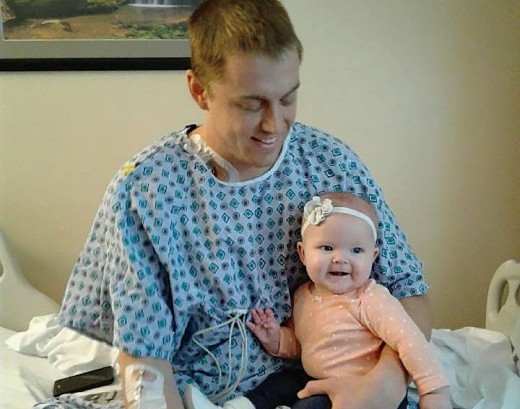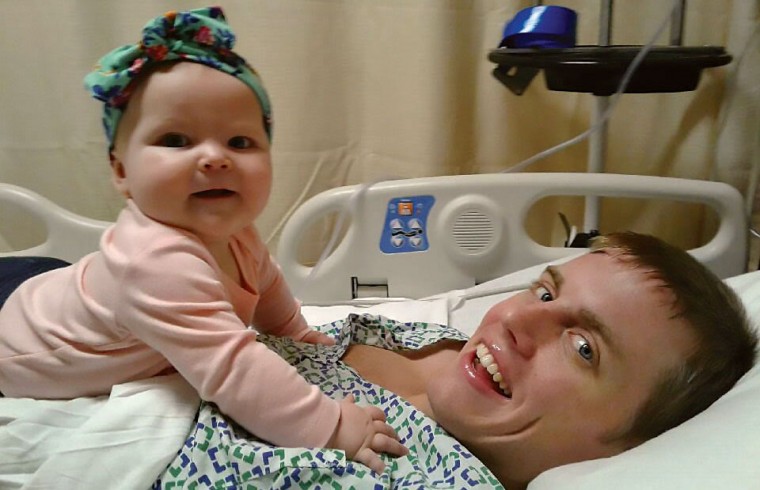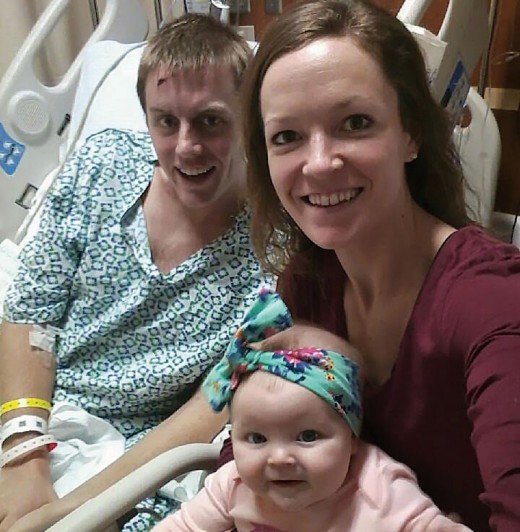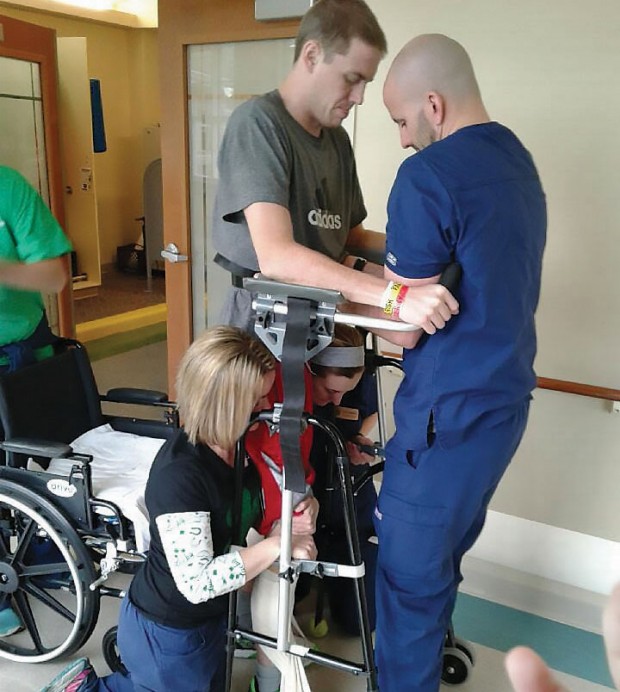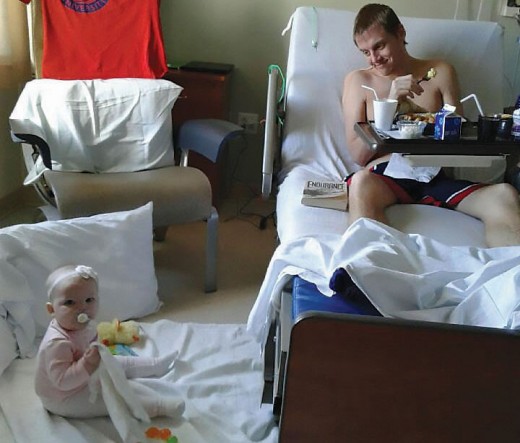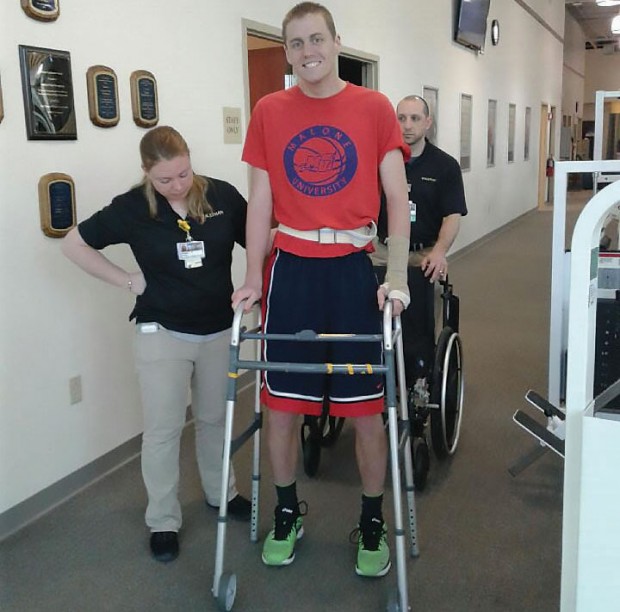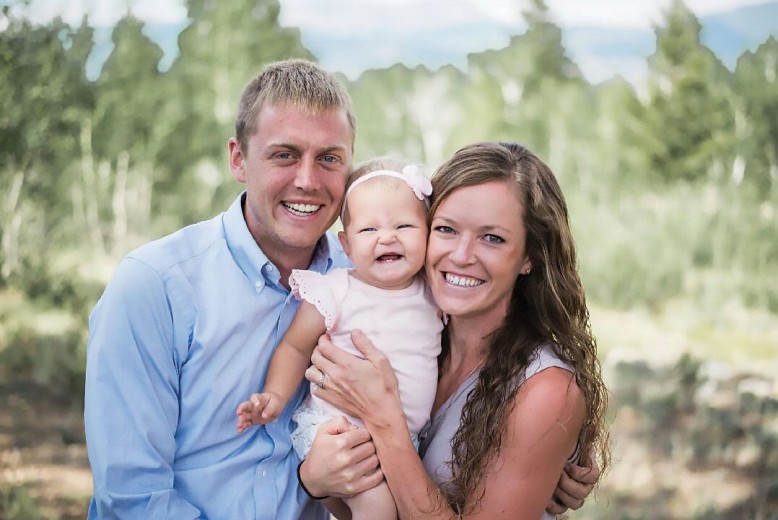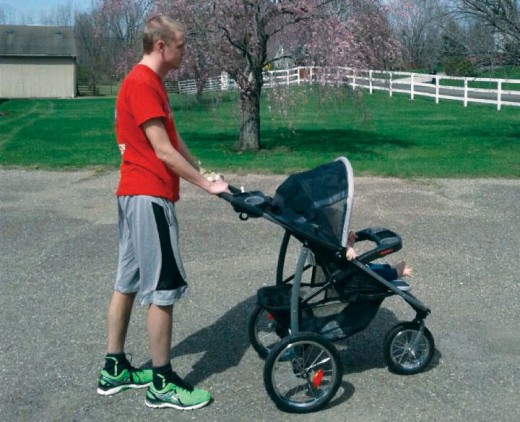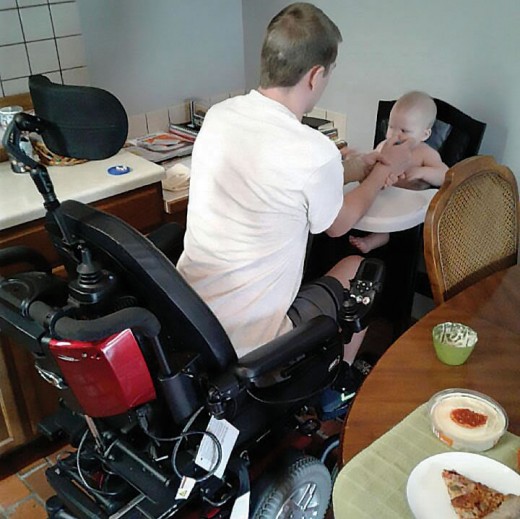You have free articles remaining this month.
Subscribe to the RP Witness for full access to new articles and the complete archives.
I first heard the letters GBS put together in the emergency room of Aultman hospital on Jan. 26. While a neurologist looked for a reflex hammer, my wife, Kimberly, and I googled the acronym. We would learn that my diagnosis was a rare disease called Guillain-Barré Syndrome. My immune system was attacking my nerve cells, causing weakness and numbness. I had started feeling the symptoms five days prior; it felt like my feet and legs were slowly falling asleep.
I was admitted to the hospital that day and was told to plan on missing about two weeks of work. Though my wife is a nurse, the hospital felt like a foreign place to me. I had always enjoyed good physical health. Now, in one week, I had gone from a healthy, active 25-year-old’s life to a hospital room with a yellow “fall risk” sticker on the door. We were given a treatment plan, a very positive prognosis, and my first of many meals in the hospital.
I spent about two and a half weeks bouncing back and forth between the hospital and a local rehab facility, depending on how I was doing. By the end of my first week I could no longer walk at all, but I did retain regular use of my upper body. The doctors said this was normal and that I might get worse before I got better.
Psalm 103 became a daily companion: “Bless the Lord, O my soul, and forget not all His benefits, who forgives all your iniquity, who heals all your diseases.” This line stood out in my mind as an anthem during a period of waiting for signs of improvement.
The Intensive Care Unit
Kimberly spent most of each day at the hospital. The staff bent the rules and allowed us to bring our five-month-old daughter Claire to visit almost every day. Family came bearing gifts: milkshakes, books, and pleasant company. I learned how to sleep decently in a hospital bed, got to know the hospital staff, and figured out my favorite meals.
On Feb. 15, I was scheduled to have my central line removed, which had been used previously to help administer treatments. Suffice it to say, my body did not respond well to this procedure. I went into shock, was placed on a ventilator, sedated, and quickly admitted to the intensive care unit. While my vital organs threatened to quit working, the doctor told Kimberly that the goal for the next 24 hours was to keep me alive.
At this point in the story, it would be negligent to forget the flood of prayer that was poured out that night, which God heard and used according to His mysterious purposes to save my life. As I battled septic shock and my blood pressure fluctuated, God heard the prayers of His people. He heard my wife and my family. He heard the saints I hope to meet someday in glory. What an incredible thought. While I lay helpless, drugged, and unaware of my predicament, the church prayed. The Lord heard them and spared my life.
My family suffered much more than I did during this time. Especially Kimberly, who spent every night in the ICU next to me on a couch. What a blessing it is now to look back and see that, though the Lord allowed us to be tested, He held us up. The promise that God “works everything together for our good” was more than a theory; it was a lifeline.
The Cleveland Clinic
I remember almost nothing of the five days between Feb. 15 and 20. It was a bizarre experience, like a dream that was gradually lifted over the course of a few days. I awoke in the Cleveland Clinic where I had been transferred for further care, though it would take me a few days to correctly answer the question, “Where are you?”
Now awake, alert, and no longer on the verge of death, I met my physical low point at the Cleveland Clinic. During my five-day slumber I had lost the use of my left hand, and my right arm would follow suit in a few days. I just couldn’t move them. Simple tasks like sending a text message were chores. Eating a small meal took me almost an hour.
Unbeknownst to me, I was also displaying significant personality changes. I babbled through an MRI, which revealed abnormalities in my brain that seemed to be causing the personality problems. This was an unexpected twist because these new symptoms didn’t usually accompany GBS. I was acting like a spoiled five year old, especially to my wife, the one person who had served me more than anyone.
As I reflect on this time, I see a fascinating picture of the gospel: a helpless and selfish cripple juxtaposed with a patient and selfless caregiver who didn’t hold back in her sacrificial service despite my sour attitude. The thought crossed her mind that I might never be the same, that a disabled and inconsiderate man might be her new husband. She served me just the same.
During this time in the Cleveland Clinic, our family made even further sacrifices to take care of Claire, who came to see me often. Her visits were an oasis in a desert of nurses, procedures, and neurological tests. I think something about her innocence helped draw me back to myself. My mind gradually returned to a normal state, though my loving family is quick to remind me that I was never normal in the first place!
Recovery
On Mar. 1, I slept through an ambulance ride back to my old rehab facility. Two weeks had passed, but it felt like much longer. Woodlawn Rehab was to be my home until I was strong enough to leave.
I was the youngest person in the rehab facility by at least 40 years. Ironically, I also seemed to be the least mobile. In the central rehab room, 90-year-old patients cruised by with their walkers as I lay flat on my back like a turtle flipped onto its shell. The only parts of my body that still obeyed were my right hand and my left arm. I soon learned that, if they worked together, they could do everything a normal arm would do. My legs were virtually immobile, and I hadn’t felt any sensation in my feet for almost one month.
Improvement came slowly at first, but each small bit of headway was a thrill. Over the course of three weeks, and with the help of many compassionate nurses and therapists, I gained enough strength to return home Mar. 23. I was confined to a wheelchair, although I was strong enough to perform most basic life tasks. We were prepared for months of recovery before I could walk. Yet, by God’s grace, I began walking independently by early April. Another answer to prayer. I never thought the simple act of walking could be such a joy.
I was able to return to school and teach for the month of May, then enjoyed a restful summer in which I gained weight, strength, and perspective on what had happened. As I write this now, in late October, I have almost no long-term effects from GBS. I am not restricted from any physical activity. Running is a sweeter pleasure than ever before, and using my arms, legs, and body without restriction is such a simple delight. We are so thankful to God for all of this; He truly does “heal all our diseases.”
Bless the Lord, O My Soul!
Kimberly and I learned much from these months of sickness and recovery. One lesson that stands out to me is reminiscent of Jesus’ words that we should “not fear those who kill the body but cannot kill the soul.” Christ was talking about physical persecution, but this truth was challenging in a time when my physical body was threatened.
We went to great lengths to ensure a successful physical recovery, and rightly so. Yet, we are commanded to “rather fear him who can destroy both soul and body in hell.” My physical health was more precious to me than I had previously thought, and by contrast I saw that my spiritual health and wellbeing were not as precious to me as they should have been.
How much more valuable is salvation compared to the ability to walk? If I were warned by human doctors about anything that would increase my chances of having GBS again, I would zealously avoid that thing (I have been given no such warning, hence the hypothetical). How much more seriously should I heed the warnings God gives in His Word, compared to warnings given by human doctors that deal only with physical health but cannot touch my soul.
Psalm 103 encouraged me to “forget not all His benefits.” Chief among these is that the Lord “redeems your life from the pit…crowns you with steadfast love and mercy…satisfies you with good so that your youth is renewed like the eagle’s.” These truths were precious. The gospel image of God redeeming my life from the pit was always true. It was never contradicted by difficult circumstances. I struggled to find joy in this truth at times and fell to grumbling, self-pity, and impatience routinely. But it was always true; it was an immovable truth that I could return to, rest in, and be grounded on. This truth gave me peace that otherwise would have been impossible.
My family and I have been richly blessed by this experience. Future trials may not be easier, but we will be armed with experience that couldn’t have been obtained in any other way. God used this illness to teach me lessons I will be learning for the rest of my life. He has given me thankfulness; life seems sweeter and more miraculous now than before. He has given me the unique perspective of being utterly helpless. Most of all, He has given me all the more reason to say with the psalmist, “Bless the Lord, O my soul!”
Cory Veldhuizen is a high school English teacher at Perry High School in Canton, Ohio. He and his wife, Kimberly, have a 15-month-old daughter, Claire. They are members of Covenant RPC in Aurora, Ohio.
